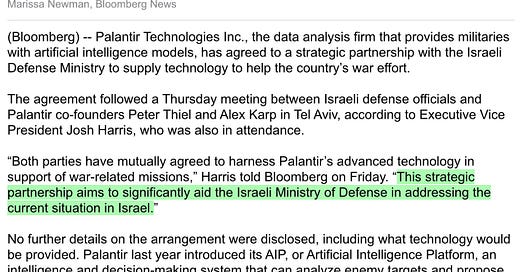Welcome back to DailyPalantir! Today’s newsletter is all about this week’s developments in Israel with Palantir — let’s get into it.
Palantir confirms their work in Israel
From Bloomberg —
Alright, so we now officially know that Palantir is supplying their software to Israel. We all speculated that this would be the case for months post Hamas attack, but today Alex Karp has confirmed that the company has entered into a strategic agreement with the IDF.
What does this mean for shareholders?
First, there will obviously be some revenue opportunities on the international government side since Israel does have a $25B defense budget and has been working with Palantir since 2014 — Palantir might give their software for free, but there will be opportunities to monetize this.
Second, it speaks to the broader thesis Karp laid out in the early 2022 interview with Kevin Warsh at Stanford university around “bad times being good for Palantir.”
Karp implies that these scenarios, while undesirable from a global perspective, highlight the value and relevance of Palantir's offerings. When nations or organizations face crises, they require robust solutions to understand and navigate the complexities of their situations. In these moments, Palantir’s products can prove to be invaluable.
Geopolitical crises often necessitate sophisticated data analysis, which Palantir's software can provide.
The importance and value of Palantir's offerings are amplified in crisis situations.
Crises allow Palantir to demonstrate the effectiveness and relevance of its products.
When faced with geopolitical problems, nations and organizations may turn to Palantir's software for solutions.
The increasing complexity of global affairs potentially creates more opportunities for Palantir.
At the end of the day, we have a host of issues going on in the world right now — Russia/Ukraine, China/Taiwan, Israel/Hamas, and now the on going problems in the Red Sea, delaying billions of dollars of cargo and forcing the US to launch airstrikes just yesterday against the Iran backed Houthis.
If the world continues to be divided, which we have no reason to believe it won’t be, then Palantir’s software will highly be in demand on the government side. The commercial business should continue to scale regardless of the geopolitical state of the world but also can be accentuated given crises, for example if a company’s supply chain flips overnight and needs some type of software that can actually give them a course of action to adjust.
Here’s a picture of Karp, Thiel, and officials from the IDF:
Karp’s Quotes to The Times of Israel
Alex Karp also spoke with the Times of Israel, and here’s some quotes on what he said:
On talent in Israel —
“I am pretty encouraged about talent here and that we are getting the best people,” said Karp speaking at Tel Aviv University. “What I see in Israel is this hybrid of talent that is qualitative and argumentative.”
“It is particularly valuable on the tech side,” he added.
On being Pro Israel —
“I think so few people speak out because they believe they can skirt by with no opinion but there is no one who doesn’t have an opinion on Israel, especially if you are a big company,” said Karp. “There are a lot of people in the industry who are maybe not as pro-israel as I am but they think of Israel as a very special place and are generally more understanding of the Israeli position and view Israel’s accomplishments of building a nation from a desert.”
But “they somehow believe that the safe position is to say nothing,” he noted.
Among the reasons for bringing Palantir’s board to Israel, Karp said, is to “embarrass other people who are pro-Israel in private but somehow not in public.”
Now, this was really interesting to me.
Alex Karp is basically saying that most companies would not side with Hamas, but are afraid to publicly say that out of fear. As I personally think about this, I do think he is correct on this basic argument. Most companies would not side with Hamas, but are concerned of the political ramfications of making this argument publicly.
Karp's decision to bring Palantir’s board to Israel serves a dual purpose. Firstly, it acts as a direct challenge to the norm of private support and public neutrality, pushing for a more transparent alignment between personal and public stances. Secondly, it seeks to 'embarrass' those who support Israel privately but refrain from doing so publicly — which by the way — is so Karp.
This action can be seen as a strategic move to influence corporate leaders to align their public stance with their private beliefs, thereby breaking the cycle of silence and neutrality on sensitive political issues. It suggests a push towards a more honest and open corporate culture where companies are expected to take clear stances on significant political matters, reflecting their internal values and beliefs. While Palantir may lose potential clients because of this, it seems like they’ve done the due diligence to expect better business results by siding with Israel from more gov contracts (not just from Israel, but other western allies like NATO given their public support) and also more business from companies that do believe in Palantir’s mission and want to support them.
Remember…
Palantir's public statement of support for Israel following the Hamas attacks aligns with its company values and business interests. On one hand, it can be seen as a reflection of the company's stance on democratic principles and the fight against terrorism. On the other hand, Palantir has a significant presence in Israel, with an office in Tel Aviv, indicating a strategic business alignment with Israeli interests.
Here are a few key points to consider:
Palantir's mission and values prioritize democratic principles and the fight against terrorism.
The company has an established presence in Israel, pointing to an existing business interest.
The public support for Israel might also be viewed as a strategic business decision.
Palantir's stance aligns with its refusal to work with authoritarian regimes and its commitment to democracy.
The decision to publicly support Israel reflects consistency in the company's ethical beliefs.
Palantir’s Gotham product was created in order to fight terrorism — so if they deemed the Hamas attacks as terrorism, they are going to obviously side with the western democracy, even if not perfect, in fighting terrorism.
Overall, we now know for a fact that Palantir is working and supplying software to Israel, and over the coming months, will have more clarity on how that software is being used and if they are helping them accomplish their goals of eliminating Hamas.
Thanks for reading — I’ll see you tomorrow in your inbox!







